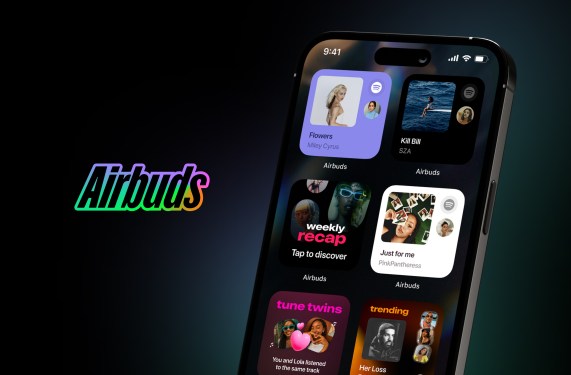A new social network has been quietly blowing up with Gen Z and younger audiences, and it is not from Meta. San Francisco-based Airbuds offers a mobile social app that lets people express themselves through their music. Users can share what they are streaming with friends through a smartphone widget that works with a range of streaming services.
On Wednesday, Airbuds announced it has raised five million dollars in funding from the early-stage venture capital firm Seven Seven Six, which was founded by Reddit co-founder Alexis Ohanian.
The startup has seen over fifteen million app downloads to date and has five million monthly active users, with one and a half million of those users launching the app daily. According to app intelligence firm Appfigures, Airbuds also has a ninety-six percent positive ratings sentiment over the last thirty days across more than ninety-four hundred ratings.
For users, the app offers a way to socialize and connect with friends, engage in self-expression, and discover new music, all in one place. That is a combination that top music providers like Apple and Spotify have yet to figure out.
Apple has tried and failed multiple times to integrate a social experience inside its music apps. That effort began with its disastrous music social network Ping, which closed down in the early 2010s, and was followed by a revamped attempt known as Connect, aimed at connecting artists and fans. Connect also did not last.
Spotify, meanwhile, has been working to make its music streamer a more social app with additions like its TikTok-inspired feeds, comments, polls, and Q&As for podcasts, artist stories, collaborative playlists, a messaging feature, and more. Yet neither company has found the sweet spot when it comes to offering a true social network, because building popular consumer social experiences can be difficult and unpredictable.
Fortunately for Airbuds co-founders Gilles Poupardin and Gawen Arab, they have had time to iterate on their ideas. Poupardin has been building products for consumers since his college days, including a Pinterest-like music bookmarking tool, a voice-controlled smart speaker that arrived just ahead of Amazon’s Echo debut, and a social audio app called Cappuccino that let friends make mini-podcasts together. Arab, meanwhile, had worked on the smart speaker with Poupardin and later did a stint at Zenly, the social app maker that sold to Snap for three hundred and fifty million dollars in 2017.
After the Cappuccino team sold the app and its related intellectual property to a meditation studio called Sociaaal, the startup moved on to a widget-oriented app, resulting in Airbuds. Poupardin explained that because he built many music products in the past, he knew that asking users to create a playlist or take other actions required a lot of effort. He observed that iOS widgets, which were still relatively new to the iPhone at the time, were popular with teens. That led him to think about building a widget that would show you what songs your friends were streaming. The process is effortless. You just connect your Spotify account, and then every time you listen to something on Spotify, it is shared on Airbuds in real time.
Today, Airbuds supports Spotify, Apple Music, Soundcloud, Musi, Deezer, Amazon Music, and Audiomack.
While Airbuds’ core functionality remains the widget, the app has built on top of that experience to offer a range of other social features. Users can react to their friends’ streamed songs with emojis, stickers, or selfies clipped out from photos with the background removed. As users scroll the app’s feed, they can play clips of their friends’ streamed songs and even chat with a friend through a simple, built-in messenger. When you want to stream your music but not share it, there is a ghost mode option to keep your listening private until it is disabled.
Airbuds will also display friends with similar music tastes and deliver a personalized Weekly Recap of what you streamed, like a miniature version of Spotify’s popular year-end review, Spotify Wrapped. The app is experimenting with a new feature that would let users join their school on the app to see the top artists from their schoolmates.
Users can also customize their profile, or Space, by adding favorite artists, songs, albums, lyrics, pictures, text, and more, or they can let the app automatically design it for them. This self-expression feature is key to the app’s traction, Poupardin believes, as around thirty percent of users now engage with the app’s features beyond just seeing what friends are streaming. He said the streaming services gave access to one hundred million songs, but nobody really cracked the identity piece or the self-expression piece, and that is exactly how Airbuds’ young users, who are mostly high schoolers and college students in the U.S., use the app. The app also has some traction in the U.K., Australia, Brazil, and Mexico.
However, some of Airbuds’ traction can be chalked up to its feature-gating, which requires users to invite friends to gain access to some of the app’s functionality. For example, you have to invite friends to see more than your top three artists in the recap. But Poupardin stresses it is not just for growth, as the app only really works if you add your friends.
With the new funding in hand, Airbuds is planning other ways to expand its app, potentially by supporting other types of streaming services, providing artist-to-fan connections, or designing features to attract older users. The team is also testing a subscription feature.
To date, the startup has raised a total of ten million dollars from investors including a16z, SV Angel, Dream Machine, Nikita Bier, Antoine Martin, Uncommon, and Night Capital. Airbuds is available on iOS and Android.

